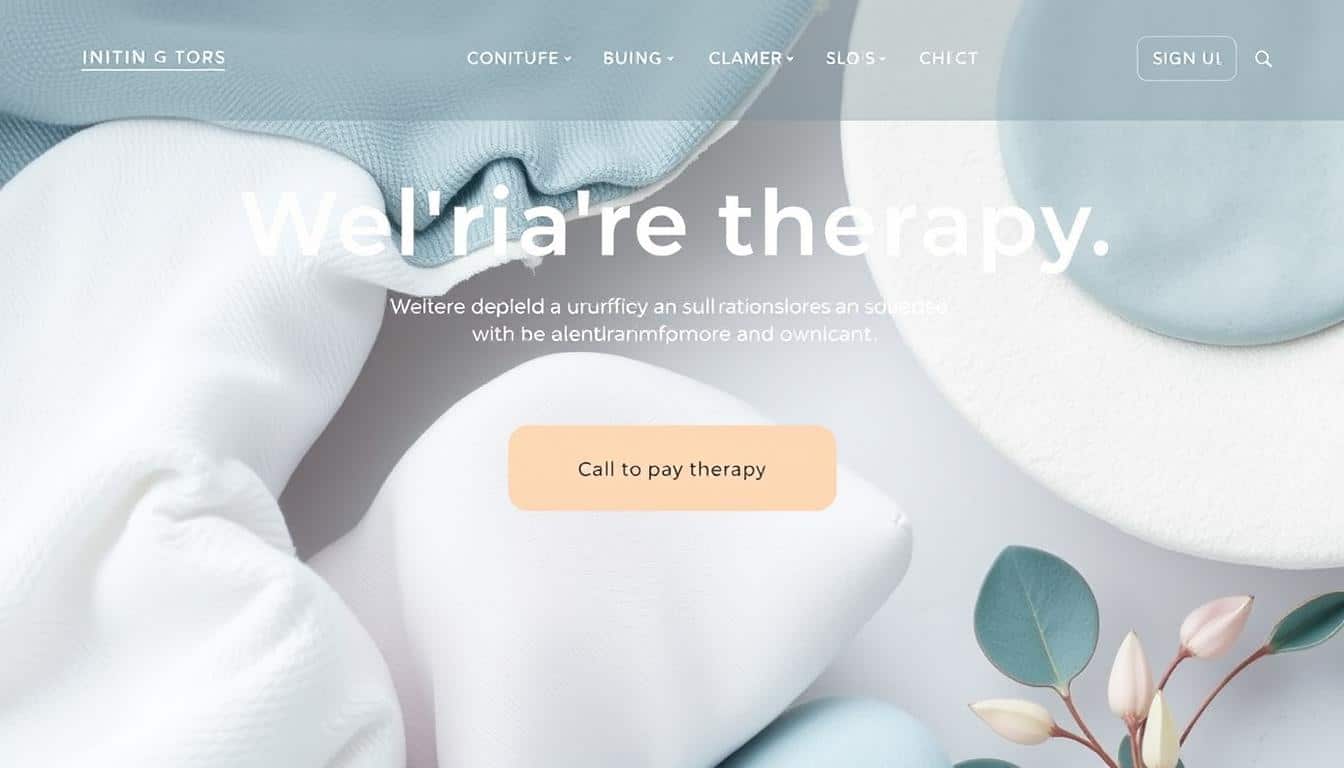Your therapy website is like a virtual door to your practice. It shapes first impressions and guides potential clients’ choices. To grow your practice, optimizing your website is key. This guide will show you how to boost your online presence.
Whether you’re an experienced therapist or new to private practice, learning therapy website optimization is crucial. You’ll discover how to make your website user-friendly and SEO-friendly. This will help you attract more clients and stand out in the mental health field.
Key Takeaways
- Enhancing your therapy website’s user experience to improve client engagement and satisfaction
- Implementing effective SEO strategies to increase your online visibility and attract more potential clients
- Leveraging local SEO tactics to connect with your target audience in your community
- Crafting compelling content and leveraging social media to establish your brand and build trust
- Monitoring and analyzing your website’s performance to continuously optimize and improve
Crafting a User-Friendly Website
To make your therapy website great, focus on easy navigation and a design that works on all devices. This makes it simple for visitors to find what they need. It also helps keep them engaged and more likely to take action.
Intuitive Navigation
It’s key to organize your website well for mental health marketing. Use a menu that’s easy to use and lets visitors find what they need fast. Group similar services or resources together and use simple labels to help visitors.
- Make sure your website works well on all devices with a responsive design.
- Put important info like contact details and booking links where they’re easy to find.
- Use clear menus and links to help visitors move around your site easily.
Responsive Design
In today’s world, your website needs to work on all screens and devices. A responsive design makes sure your site looks good and works well on any device. This gives users a consistent and easy experience, whether they’re on a computer or phone.
| Device Type | Responsive Design Considerations |
|---|---|
| Desktop | Make it easy to read and navigate on bigger screens. |
| Tablet | Adjust content and layout for the middle-sized screen, keeping it easy to use. |
| Mobile | Focus on features that work well on phones, like big buttons and simple menus. |
By focusing on easy navigation and a responsive design, you can make a website that looks good and works well. This will help improve your website’s performance and keep users engaged.
Search Engine Optimization Essentials
In the digital marketing world, SEO is key for therapists wanting to grow online. Learning SEO basics can make your therapy website more visible. This attracts more people looking for your services.
Keyword Research and Integration
Start by doing deep keyword research. Find out what terms people use to find therapists like you. Use these search engine optimization for therapists, psychology practice digital marketing, therapist website ranking factors, and counseling website conversion rate optimization keywords in your site’s content and structure. This boosts your search rankings and brings more visitors to your site.
Make sure to add these keywords naturally in your site’s content. This includes your home page and service pages. Focus on where, how much, and how well you use them to meet your audience’s needs.
“Effective keyword integration is the foundation for any successful psychology practice digital marketing strategy.”
Learning to optimize your site for conversions is crucial. This way, you’ll build a strong online presence. It will attract the right people to your mental health services.
therapy website optimization
Optimizing your therapy website is key to getting more clients. By using smart therapy website optimization, mental health website marketing, and online counseling site optimization, you can show off your skills. This helps build trust and brings in more psychology practice digital marketing and counselor website traffic strategies.
Making your website easy to use and counseling website conversion rate optimization is vital. You need a simple layout, a design that works on all devices, and content that speaks to your audience.
Also, Dreem Therapy says using SEO-driven keywords and content marketing boosts your site’s ranking. This helps more people find your therapy services online.
“Optimizing your therapy website is not just about aesthetics – it’s about creating a seamless, impactful online presence that truly resonates with your clients and drives meaningful results for your practice.”
The work of therapy website optimization never stops. Keep checking how your site is doing and make changes based on what you learn. This way, you can always get better at mental health website marketing and counselor website traffic strategies.

By following the rules of online counseling site optimization and psychology practice digital marketing, you can make your therapy business online visibility shine. You’ll become a go-to place for people looking for mental health professional site enhancements and counseling website conversion rate optimization.
Utilizing Local SEO Strategies
As a mental health professional, search engine optimization for therapists is key to attracting local clients. By using local SEO, you boost your therapy business online visibility. This helps you connect with people in your area.
First, make sure your website is set up for local searches. Use keywords like “therapist website ranking factors” and your city’s name in your content and metadata. This will help you show up higher in local search results. It also increases the chance of people finding your psychology practice digital marketing services nearby.
Then, update your business listings on sites like Google My Business. Make sure your contact info, hours, and other details are current. Ask your clients to leave positive online reviews. These can really help your mental health professional site enhancements and improve your local SEO rankings.
By using these local SEO strategies, you can build a strong online presence. This attracts nearby clients who need your therapy services. A well-optimized website and active online management are crucial for expanding your therapy business and reaching the right audience.
“Effective local SEO is essential for mental health professionals who want to connect with clients in their community.”
Content Marketing for Therapists
As a mental health professional, content marketing is a great way to show your skills. It helps build trust and brings more people to your website. By posting blogs and videos, you can grow your online presence and connect with more clients.
Blogging for Therapists
Blogging is a smart move for therapists. Write mental health website marketing blog posts that solve your clients’ problems. Talk about topics like online counseling site optimization and psychology practice digital marketing. This makes you a trusted mental health professional site enhancements.
Video Creation for Therapists
Don’t forget about videos. They’re a great way to share your knowledge and engage with your audience. Make short videos on mental health topics or record mental health website marketing webinars.
“Content marketing is not about you, it’s about your audience. Focus on creating content that solves their problems and meets their needs.”
Keep making top-notch content to draw more visitors to your site. This helps you build stronger client relationships and grow your psychology practice digital marketing and counselor website traffic strategies.
Social Media Presence
In today’s world, having a strong social media presence is key for mental health pros. It helps them reach their audience and boost their online presence. By using platforms like LinkedIn, Instagram, and Facebook, you can share your knowledge, post valuable content, and connect with people.
Platforms for Mental Health Professionals
Choosing the right social media platforms is important for mental health website marketing. Here are some top choices for your psychology practice:
- LinkedIn – Great for showing off your skills, sharing insights, and networking with others in healthcare.
- Instagram – Perfect for sharing inspiring quotes, self-care tips, and glimpses into your work.
- Facebook – Huge user base makes it ideal for building a community, sharing educational content, and talking to followers.
It’s important to have a consistent, real, and engaging social media plan. This plan should highlight what makes you special and help you connect with your audience.
“Effective social media marketing for mental health professionals is all about building genuine connections and providing valuable, relevant content to your audience.”
| Social Media Platform | Key Benefits for Mental Health Professionals |
|---|---|
| Establish professional credibility, network with other healthcare providers, share industry insights | |
| Visually showcase your brand, share inspirational content, connect with a younger demographic | |
| Build a community, share educational content, engage directly with followers |
Enhancing User Experience
Creating a great user experience on your therapy website is key. It helps keep visitors and encourages them to book an appointment or contact your practice. Focus on making your site mobile-friendly, easy to navigate, and clear in what you want visitors to do. This boosts engagement and counseling website conversion rate optimization.
Mobile Optimization
Today, many people visit websites on their phones. So, making sure your therapy website optimization works well on mobile is crucial. Use a responsive design that looks good on all screens. This makes it easy for clients to find your services and info anytime.
Also, make sure your site loads quickly and is easy to use on touch screens. This creates a smooth, online counseling site optimization experience for mobile users.
To improve the user experience, add features like click-to-call buttons and mobile-friendly appointment scheduling. Also, make sure your contact info is easy to find. This makes it simple for potential clients to reach out and take the next step.
| Mobile-Friendly Feature | Benefit |
|---|---|
| Responsive Design | Seamless adaptation to various screen sizes |
| Fast Loading Times | Improved user engagement and therapy business online visibility |
| Touch-Based Navigation | Intuitive and user-friendly mobile experience |
| Click-to-Call Buttons | Simplified client-therapist communication |
By focusing on mobile optimization, your therapy website will offer a great experience to all visitors. This leads to more counseling website conversion rate optimization and client engagement.
“The true user experience is the entire journey, from the first time a client discovers your website to the moment they successfully book an appointment or connect with your practice.”
Online Reputation Management
Your online reputation is key to your success as a mental health professional. Today, people check online reviews to see if a therapist is trustworthy. By managing your online reputation, you can build trust and attract more clients.
One important step is to keep an eye on your online reviews. Answer both good and bad feedback quickly and professionally. Ask happy clients to share their stories to improve your counseling website conversion rate optimization.
- Regularly monitor online reviews and ratings on platforms like Google, Yelp, and Facebook.
- Respond to reviews, thanking clients for positive feedback and addressing any concerns with care.
- Incentivize satisfied clients to leave reviews, which can help build a strong online reputation.
Also, make sure you have a strong social media presence. Use platforms your clients like to share your knowledge and build trust. This can also help with your search engine optimization for therapists.
| Platform | Benefits for Mental Health Professionals |
|---|---|
| Engage with clients, share educational content, and build a community. | |
| Showcase your practice’s visual identity and connect through visual storytelling. | |
| Establish your professional credibility and connect with other healthcare providers. |
By actively managing your online reputation, you can shape your digital image. This will help attract more clients and boost your practice’s reputation in the community.
Tracking and Analyzing Website Performance
It’s crucial to keep an eye on how your therapy website is doing. This helps you see what’s working and what needs work. A great tool for this is Google Analytics. It gives you insights into your website’s traffic, how users behave, and how well they convert.
Unlocking the Power of Google Analytics
Google Analytics is packed with data to help you improve your therapy website optimization. By looking at page views, bounce rates, and how long users stay, you learn a lot. This knowledge helps you tweak your counselor website traffic strategies and counseling website conversion rate optimization plans.
- Analyze website traffic patterns to identify popular content and user journeys
- Understand user behavior, such as which pages they visit and how long they stay
- Monitor conversion rates and track the effectiveness of your calls-to-action
- Identify and address any pain points or bottlenecks in the user experience
Google Analytics is a game-changer for improving your therapy website. It helps you make smart choices based on data. This way, you can attract the right people and get them to take action.
“Tracking and analyzing website performance is key to understanding what’s resonating with your audience and where you can make improvements. Google Analytics is an invaluable tool for any therapy practice looking to optimize their online presence.”

By using Google Analytics on your therapy website, you get to see what’s working and what’s not. This data helps you make better decisions for your therapy website optimization, counselor website traffic strategies, and counseling website conversion rate optimization. This approach ensures your online presence is effective for your practice.
Collaborating with SEO Professionals
Working with SEO experts can really boost your therapy website. They know the latest tricks and techniques to get you noticed online. This means more people will find your practice who are actually looking for help.
Team up with a reliable SEO partner to make sure your marketing is up-to-date. They’ll check your site, find what needs work, and fix it. This will help your website rank better and more people will see it.
SEO pros are great at finding the right keywords and writing engaging content. They’ll help you make your website better, use local SEO, and connect your social media to your marketing. This way, you can reach more people and grow your practice.
“Collaborating with an SEO expert is like having a digital navigator to guide you through the complex world of online visibility. Their insights and strategies can propel your therapy practice to new heights of success.”
Working with a good SEO agency or consultant can really help your online presence. It’s a smart move if you want to grow your therapy business. So, if you’re looking to improve your website, consider what an SEO pro can do for you.
Conclusion
In today’s digital world, making your therapy website better is key. It helps you stand out online and draw in more clients. A well-optimized website shows off your skills and helps your mental health business grow.
Start by making your website easy to use and look good on all devices. Learn about search engine optimization (SEO) to get more people to find you. Use local SEO strategies and content marketing to boost your online presence.
Don’t forget about social media and making your website work well on phones. Keeping a good online reputation and working with SEO professionals can make your marketing even stronger. This ensures your online counseling site optimization and psychology practice digital marketing are working together for success.



